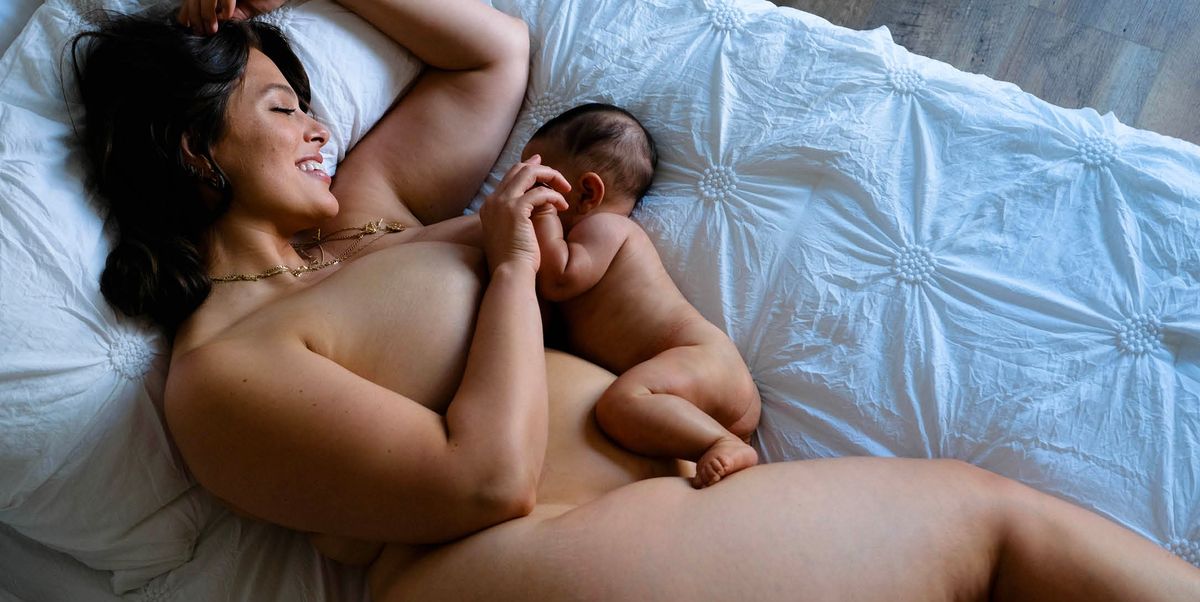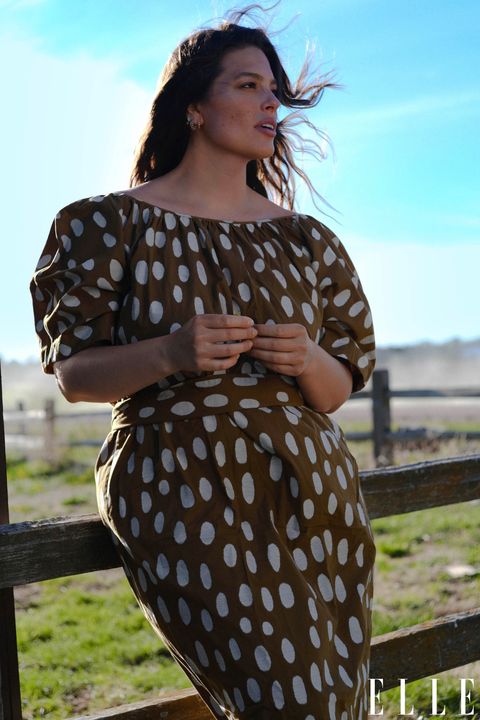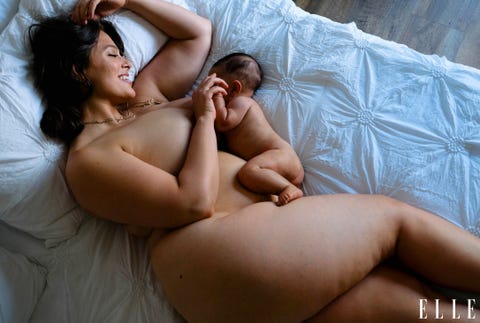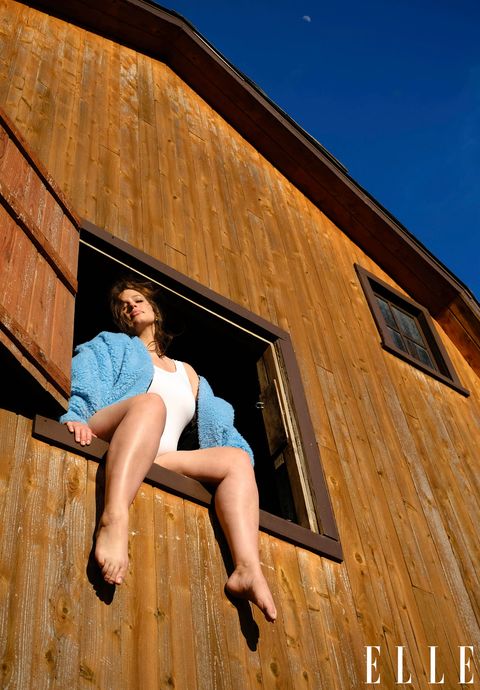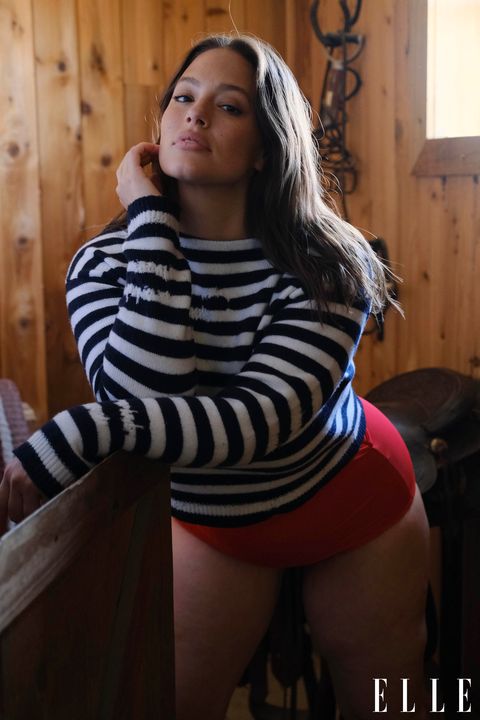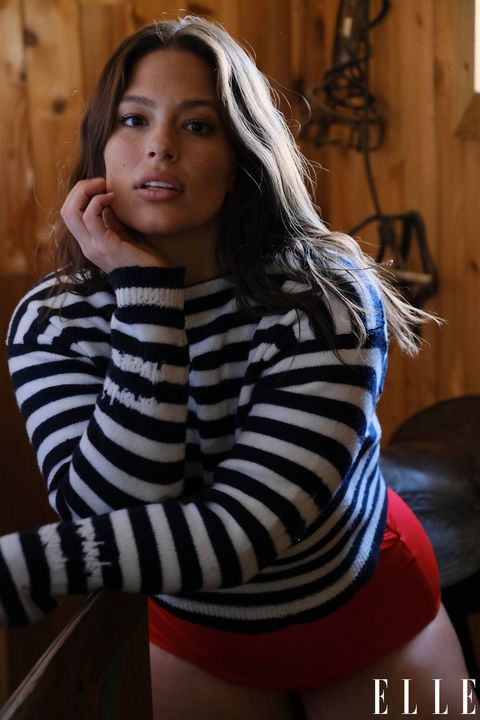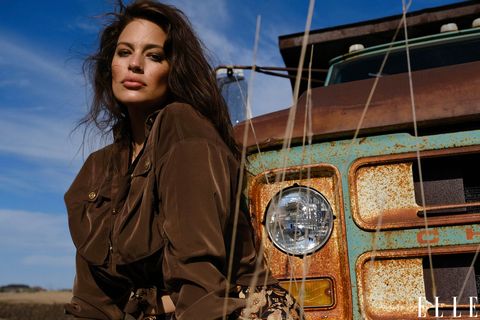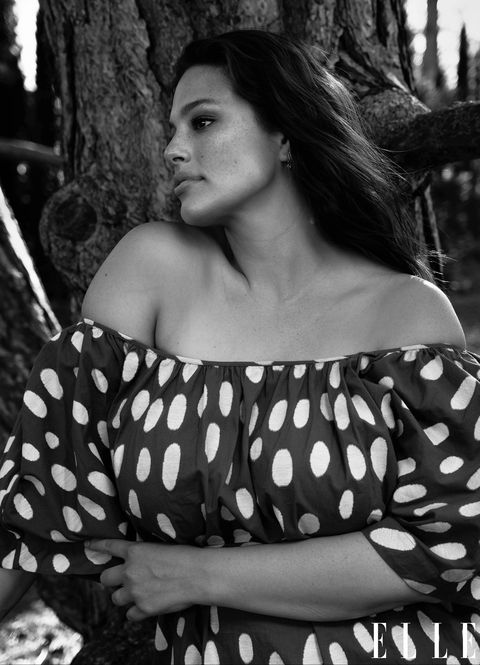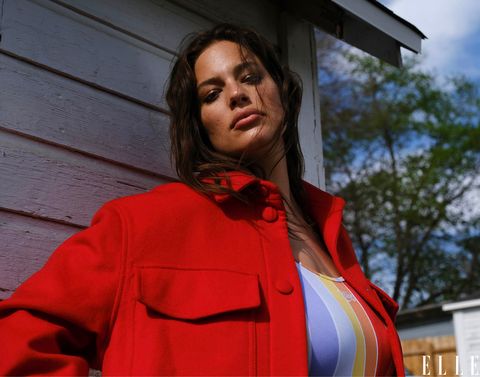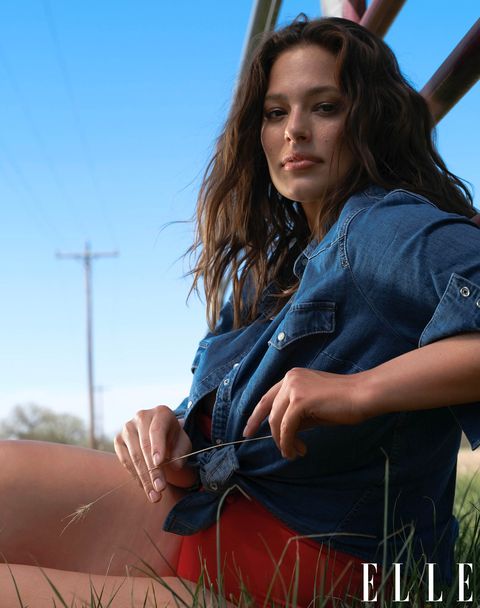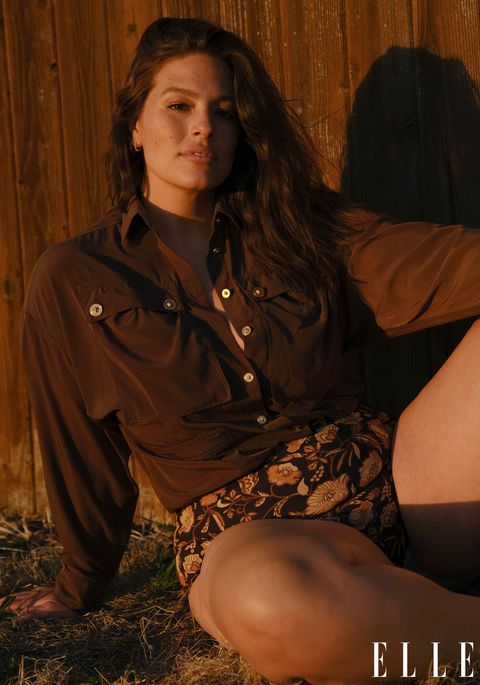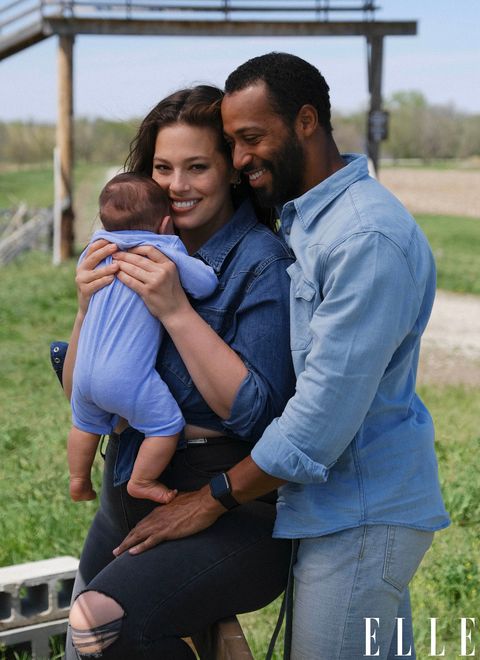Dialing in from a farm in Nebraska, where she is sequestered with her husband and seven-month-old baby boy, the supermodel opens up to close friend Kristen Bell about the “astronomical pain” of her natural childbirth, standing up for racial equality, and why she is not above putting on a full face beat for a Zoom meeting.
KRISTEN BELL: Hello, my friend. I’m excited to be interviewing you.
ASHLEY GRAHAM: Thanks for doing this! You are Supermom—juggling everything in the whole world right now—so I appreciate this time you’re taking.
KB: So are you! I’m thrilled to be doing this. You gave birth last January at home, which is a milestone in anyone’s life. Did you expect it to be like it was?
AG: Hell, no. First of all, I had no idea it was going to hurt that bad. Let me just go there for a second: Every mother talks about, “Oh yeah, it’s painful.” Whether they got an epidural or not, or a C-section, whatever happened, they’re like, “Yeah, it hurt.” And they say it kind of calmly like that. They don’t go into the astronomical pain that you go through, especially if you choose to go natural. So there’s that. The silver lining in all this is that I gave birth just before quarantine, so I’ve been able to watch Isaac grow up before my eyes.Experiencing every single moment with him has been a dream come true. I feel really bad for the next kid, because I don’t know if they’re going to get this much attention.
KB: They never do. I have two, and I’m going to be honest with you: They never do. You really have the second one for the first one. I mean, you love the second one. Your love doesn’t divide—it multiplies—but they definitely don’t get enough attention. That’s why the second ones are always a little bit more resilient.
AG: Yeah, that makes sense. When I look at my new stretch marks and the changes that my body went through, it reminds me that, as women, we’re all superheroes. I’m always reminded that our bodies were built to do this. It’s such a beautiful thing to be able to give birth, but I didn’t realize it until afterward.
KB: That is exactly what I think when I look down at my body. I’m like, “Every mark on me now, every shape that has changed since I had kids, that’s evidence of the fact that I am a superhero.” I hope women look down at their bodies and feel the same way.
AG: I really hope so, too. Before I was even pregnant, that was always my hope for women in general, that they could learn to continue to love their bodies through the changes and the ups and downs. And then, when I got pregnant, I had to reimagine my relationship with my body with this creature inside me taking over. I was gaining weight so rapidly. Then, to get stretch marks on my stomach, that to me was like, “Oh my gosh. I can’t believe this happened.” At first it felt devastating, and then when I met Isaac, I said, “No, this is exactly what every woman has talked about for ages. This is not just a battle wound. This is something that has changed my life forever, and I’m going to celebrate my new body.”
KB: Me too. I wouldn’t change it in a million years. Tell us more about Isaac: Where is he at right now? Is he sleeping through the night? Are you trying to sleep-train? Or are you just letting it happen?
AG: Everybody has an opinion, right? But I just kind of did what I wanted to do. Isaac is not sleep-trained, but he only wakes up maybe once or twice in the night, max. I feel 100 percent rested, so it’s not like I’m living in agony everyday like, “He didn’t sleep last night.” We’re walking into month [seven], and he’s screaming at the top of his lungs. He thinks it’s so fun to be louder than Mom and Dad. I think we’ve figured out the diapers we like, and we only have maybe one blowout a week. And I’m still breastfeeding.
KB: That is fantastic. What bonds us is not how we’re parenting, it’s that we are parenting. If what’s happening in your household is working for you, then you don’t need to receive any advice on how to change it. That’s confident mothering.
AG: I love that. That’s a great phrase. I’ve got a couple of family members who are pregnant, and my instinct is to say, “Oh, do this, do that.” But I stop myself every time, because I remember how I felt when everybody told me what to do and sent me their unsolicited advice and their lists. If there’s a question to be asked, ask it. But other than that, keep your trap shut and just let that mother figure it out. The mommy-shaming on social media is out of control.
KB: Yes, that is absolutely canceled! Quarantining with a newborn must present its own set of unique challenges.
AG: Yes! I’ve had to learn how to be creative and how to live under one roof with my mom, her boyfriend, my husband, and my son. It’s been hard to see what’s happening around us. But I believe we need to stay positive, so we’ve been doing a lot of affirmations. One of the main affirmations that we repeat all the time is “Fear Not.” We’ve got Bible verses that go with Fear Not; we’ve got songs. That’s one way we have combated a lot of the fear. We turn the TV off as well.
KB: In addition to the pandemic, you’ve had to navigate new motherhood during a period of renewed racial unrest. How are you processing everything that’s been going on?
AG: Our country is in pain. George Floyd, Breonna Taylor, Ahmaud Arbery, and their families deserved better. Everyone in the Black community whose voice has been ignored for far too long deserves better. My son Isaac is only a few months old, but the past few weeks have sparked deeper conversations in our family around the inequalities facing the Black community and what it means to be Black in America. I want him to grow up in a world where justice exists for everyone and no one is discriminated against because of the color of their skin.
KB: How are you lending your voice?
AG: As someone in the public eye, I feel it is my duty to be an advocate for change. Giving Black voices a platform to share their experiences and perspectives helps our nation listen, learn, and do better. I was extremely honored to recently take part in the #ShareTheMic campaign, which aims to amplify the voices, stories, and calls to action of Black women so we can catalyze change together. Opal Tometi, a renowned human rights advocate and cofounder of Black Lives Matter, took over my platform to share her perspective and highlight the important work she is doing in the fight against systemic racism. I’m so inspired by Opal, and during her takeover, she discussed how ally is a verb and the world doesn’t know you’re an ally unless you’re in motion. Her words really resonated with me, and I’ve been listening to Opal and other Black leaders’ voices to better understand how I can be an ally in motion in their fight for a better tomorrow. I’m also reading and listening to other activists and writers, such as Luvvie Ajayi, Rachel Cargle, and Brittney Cooper, to continue educating myself on the stories and issues that matter.
This content is imported from Instagram. You may be able to find the same content in another format, or you may be able to find more information, at their web site.
KB: What does being an ally of the Black community mean to you?
AG: Being an ally means taking action. In addition to showing support for Black-owned businesses, it’s important to also get involved with organizations that are creating change, such as Campaign Zero, which recently partnered with Next Generation Action Network to meet with local city officials across the U.S. to cut police budgets and redistribute those funds to community-based alternatives. It’s also essential for both big and small businesses to continue prioritizing diversity and inclusion in their hiring practices, ensuring their teams’ makeup is representative of the world we live in. We must keep these businesses accountable so this continues to be a priority. Change and impact also starts at the ballot box—not only for the presidential election in November but for local city and state elections as well. We need to make our voices heard and elect people who will enact the change we and the Black community need.
KB: What gives you hope today and for the future?
AG: Seeing people from all walks of life come together in solidarity over the last few weeks. Of course, this is just the beginning. We have so much work left to do. We must continue to spotlight injustice whenever we see it, demand reforms to laws and police practices that harm our communities, and actively participate in our democracy through local, state, and national elections.
KB: With all the stress you’re under, how are you staying sane during quarantine? I have such anxiety and depression ebbing and flowing that one way I balance it is by working out. I have a friend who used to run a CrossFit gym, and he’s been doing a livestream everyday at 11:00 a.m. called “Indoorphins.”
AG: Working out has been so important for my mental health and my sanity! My mom has been my partner. We work out three to four times a week. We do FaceTimes with my trainer Kira, and I love to do Instagram Lives with her. Half the time I can barely keep up and I wimp out halfway through, but I like doing it with thousands of other people. Maybe they’re just sitting there watching and commenting, or maybe they’re actually working out; either way, it makes me feel like I’m not alone. It keeps me accountable knowing other people are expecting it and looking forward to it because it’s keeping them sane, too.
KB: Fitness was never a priority for me when I was younger. It was something that I had to learn to embrace because of my mental health. Did you grow up exercising?
AG: Both of my parents are big-time athletes. They both played sports in college, so they kind of bred us to be athletic. We didn’t really get the opportunity to choose if we wanted
to play sports or not. They just kind of threw us into it. We played basketball, soccer, volleyball, and a little bit of softball. We’ve just always moved our bodies and gotten sweaty and been active. But I stopped working out when I moved to New York at 17 because I just didn’t care. As a model, I started hearing things like, “Your body has to look a certain way.” But at the time, that didn’t motivate me. Eventually, I came to realize that working out made me feel good. Something I like to say now is,“Motion is lotion.” If I’m not moving my body, it’s going to get tight and achy—and when I am moving my body, it feels loose and I feel fearless, like I can do anything. I honestly believe working out throughout my whole pregnancy helped my labor—it only lasted six hours! I’m so glad that I did so much cardio and so many squats in my third trimester.
KB: Oh, girl. I had a 26-hour labor, so I clearly could have used your recommendations for staying fit late in pregnancy!
AG: Well, I will say, to sum it all up: I did cancel on my trainer this morning, because I just didn’t want to get out of bed. So there is that.
KB: No one’s striving for perfection here. On a lighter note, I’ve noticed on Instagram that you’ve also been staging a lot of fashion shoots and experimenting with dramatic makeup looks before you do Zoom calls. Is that helping to break up the monotony a little bit?
AG: Oh, definitely. I have a partnership with Revlon, so they keep sending me boxes of new makeup to test out. When you’re home and you’re about to do a business call, it’s like, “Why not learn how to do my eyes and figure out how to do an eyeliner?” All these Zooms can be a lot—it’s overwhelming to have so much screen time. So why not break it up by switching your makeup? It’s just fun. I mean, what else am I going to be doing? I’m breastfeeding, I’m changing diapers, and I’m doing a new look for each Zoom.
KB: I couldn’t agree more. I remember right after I had my kids, I wanted to try on fancy clothes that I hadn’t worn in a while or get a blowout, even though normally I don’t care much about that. It’s fun to be creative and use your body as a canvas. Do you have a new favorite product that you’re working with right now?
AG: Yes. I have this amazing Revlon palette called Tropical Vibes. It’s got eyeshadows, blush, and highlighter, and there are two different palettes. I like it because the colors are a little bit unique and funky but still all go together. I can do a full-on beat without having to use anything other than that palette. Obviously I still need foundation, concealer, and mascara, but basically everything else is all right there.
KB: I love that you call it a beat. When we worked together a couple of months ago and you said “beat,” it was the first time I’d ever heard it, and I love it, and now I’ve added it to my vocab.
AG: Yes, because it’s like you’re beating your face.
KB: I was like, “Get out of Mommy’s bathroom, girls. I’m doing a beat right now.” And they were like, “What?”
AG: Do your girls like makeup?
KB: They love it. My makeup brushes kept disappearing up until about a year ago. They would take them out of my makeup drawer and go use their watercolors or their acrylic paint outside. I would find them all over the lawn corroded with children’s paint. Once I finally explained to them that the brushes were for makeup, they decided it would be fun to go into my drawer and play with my palettes. Nowadays, they’ll walk out of my bathroom with a ghastly beat on their face, and I’ll say, “Did you go into Mommy’s drawer this morning?” And they’ll just look at me and go, “No.No.” And I’m like, “Okay. All right.” I don’t know where else that conversation can go.
AG: We’ll have to send a package of Revlon products for you and your girls so you don’t have to share.
KB: One thing I’m striving to teach my girls is that I think of makeup as a fun form of self-expression. I say, “You use paper to paint on, and I use my face. I don’t wear makeup because I think I need it or I’m trying to live up to something.” What are your feelings about makeup? Have you always loved doing it because of the creativity behind it? Or, growing up as a model, did you ever feel like you were using it to try to fit in?
AG: I’ve never been asked that question before! It makes me go back to getting ready in my mom’s bathroom with her. She would have her little makeup bag with her essentials: blush, foundation, mascara, concealer. It was just a part of her daily routine. It wasn’t a cover-up; it was more like, “I brush my teeth, I do my hair, I do my makeup, I put on my deodorant and my perfume, and I walkout the door.” It became a daily routine for me because of my mother. Something else she did that was brilliant: She never talked poorly about herself. When my mother and I were looking in the mirror doing our makeup together, she was never like, “I’m going to cover up these wrinkles. I’m so fat. I need to lose weight. I don’t like my neck.” It was always positive affirmations about herself, which created positivity around me. So I never thought negatively of myself until I started modeling and hearing people say things like, “Oh, it’s time for you to lose weight,” or “You didn’t get this job because….”
KB: Do you have any beauty routines that you’ve let slip during quarantine? I’ll start with the fact that I used to be a blonde. I am no longer in that category.
AG: I feel so bad for all my blond friends. Y’all are really going through it right now. I mean, when CBS Sunday Morning does a special on hair coloring, that’s how you know that it’s gotten really bad in America.
KB: Have you let anything slip?
AG: I haven’t shaved my legs, my bikini line, or my armpits since my third trimester, and I don’t care. And then there’s my teeth. I’ll be eating lunch and I’ll say, “Oh, I think I forgot to brush my teeth.” Justin, my husband, keeps saying,“How did you forget that? How do you not taste your breath?”
KB: In my normal life, I rarely shave my legs. Ironically, I think I’ve shaved my legs more during this quarantine than I have in my entire adult experience, simply because I have the time.
When I get into the shower, it doesn’t have to be 90 seconds. I have time to actually shave. It’s kind of exciting, and it’s fun to do at-home beauty stuff. Have you gotten any haircuts?
AG: No, I haven’t. My husband cuts his own hair, and he luckily had already learned that trade, but no, girl. I’m sitting over here with split ends. I can’t wait to have a full-on haircut.
KB: How does he cut the back?
AG: It’s a double-mirror situation.
KB: Oh my gosh. You should do a Live of him giving a tutorial about how to cut the back of your hair. I think people would love that—your fans love all your Facebook Lives! It’s so inspiring to see how, even during quarantine, you continue to be a role model to so many women, especially when it comes to body positivity. In an industry that is notorious for commodifying women, how have you managed to stay so grounded?
AG: When it comes to Facetuning and altering your body—erasing body parts and cellulite and lifting and tightening—I pass on all that; I simply don’t follow those people. I think you can actually change your experience with the language you use. Your words have more power than you realize. When you say something about yourself, whether it be good or bad, you give it life. So either you’re going to put a roadblock in front of your future, or you’re going to open up the gate. I always tell young women, “If you think something bad, don’t say it out loud, because when you say it out loud, it becomes a reality. And then you have to walk backward in order to get rid of that roadblock.”
KB: You’re writing your own story, right? Everyone can write his or her own story.
AG: Yes. You should be in charge of your own story. I let the fashion industry take over my body for too many years. The moment I stepped free and said,“Enough is enough—I’m going to do what I want,” is when I started seeing changes, not only in my personal life but in my professional life. But it really takes hard work.
I’ve been modeling for 20 years and doing this kind of mental work for 15 years. And it’s not a light issue. It’s a life-threatening struggle for some women with eating disorders. I always let young people know, “You have to have role models; you need affirmations. What are you doing to better yourself in that capacity?”
KB: You are such a pillar for young girls, talking about these issues and not talking about them frivolously. Talking about the fun that you can have with makeup, but also identifying what’s beautiful about you is that there’s no one else like you. You’re the only you. And taking those things seriously and not letting them sort of break your life down. It’s real work.
AG: It sounds like you’re doing a great job with your girls, though. That’s awesome.
KB: I mean, I’m trying. But I’ll probably be calling you for more advice as they grow up, since you know a lot more about this topic. I want to ask you about one other thing: During quarantine, I know you teamed up with Bella +Canvas and Until We Do It to donate nonmedical masks to vulnerable, underserved communities. Can you tell us a little bit about that experience?
AG: Bella + Canvas has committed to donating 5 million face covers to organizations and communities in need. This is a time where, when you have a platform, it’s incredibly important to use it. I was really honored that they asked me to be a part of this, because face masks are really hard to find.
KB: That is fantastic. Making them more readily available is going to make everybody feel safer.
AG: Exactly. This has been such a tough time for all of us, but we’ve seen so much good, and it makes me feel hopeful that we will continue to take care of each other.
KB: Do you think that’s the secret to a happy quarantine? That we just have to focus on taking care of each other?
AG: I think so. I think getting out of this quarantine, my biggest hope is that we’ll continue to have these same actions toward our neighbors, and we’ll be a little bit more sensitive toward them.
KB: Wouldn’t that be beautiful? We need to remember that. Well, thank you so much for talking with me. This has been so fun.
AG: No, thank you. One day we’ll give each other a hug.
KB: One day. Oh my gosh, I’m going to squeeze you so tight. We’ll compare stretch marks and it’ll be beautiful and we’ll let our babies play.
AG: Yes—love it!
This story originally appeared in the August 2020 issue available on Apple News+.
